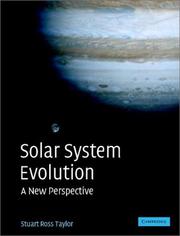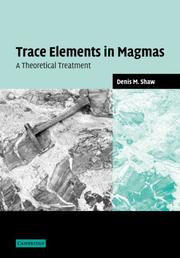| Listing 1 - 10 of 18 | << page >> |
Sort by
|

ISBN: 9780582823037 Year: 2004 Publisher: London : Longman,
Abstract | Keywords | Export | Availability | Bookmark
 Loading...
Loading...Choose an application
- Reference Manager
- EndNote
- RefWorks (Direct export to RefWorks)

ISBN: 0521641306 Year: 2001 Publisher: Cambridge Cambridge University Press
Abstract | Keywords | Export | Availability | Bookmark
 Loading...
Loading...Choose an application
- Reference Manager
- EndNote
- RefWorks (Direct export to RefWorks)
Book
ISBN: 0521372127 Year: 1992 Publisher: Cambridge : Cambridge University Press,
Abstract | Keywords | Export | Availability | Bookmark
 Loading...
Loading...Choose an application
- Reference Manager
- EndNote
- RefWorks (Direct export to RefWorks)
This book describes the origin and evolution of the solar system, with an emphasis on interpretation rather than description. Starting with the Big Bang 15-20 billion years ago, it traces the evolution of the solar system from the separation of a disk of gas and dust, the solar nebula, 4.7 billion years ago. The problems of the formation of the Sun and the planets are considered beginning with Jupiter and the other gas giants, and ending with the formation of the Earth, the other rocky inner planets and the Moon. All planets, satellites and rings are different and random encounters have played a major role in the evolution of the system: the Moon is the product of a chance collision. The author concludes that the solar system is probably unique; other planetary systems may be common, but will probably not resemble ours either in numbers or types of planets.
Astrochemistry --- Chemie [Cosmo] --- Chimie [Cosmo] --- Cosmic chemistry --- Cosmochemistry --- Cosmochimie --- Kosmochemie --- Solar system --- Space chemistry --- Système solaire --- Zonnestelsel --- 523.2 --- Chemistry --- Space sciences --- General properties of the Solar System --- Solar System --- Origin. --- Cosmochemistry. --- Solar system. --- 523.2 General properties of the Solar System --- Milky Way --- Origin --- COSMOCHEMISTRY --- SOLAR SYSTEM --- ORIGIN
Book
ISBN: 0080182747 0080182739 1322252661 1483160890 9780080182742 Year: 1975 Publisher: New York : Pergamon Press Inc.,
Abstract | Keywords | Export | Availability | Bookmark
 Loading...
Loading...Choose an application
- Reference Manager
- EndNote
- RefWorks (Direct export to RefWorks)
Moon --- Lune --- Moon. --- 523.3 --- GG General Geology --- Moon Cycle --- Moon Phases --- Lunar Cycle --- Lunar Phases --- Cycle, Lunar --- Cycle, Moon --- Cycles, Lunar --- Cycles, Moon --- Lunar Cycles --- Lunar Phase --- Moon Cycles --- Moon Phase --- Moons --- Phase, Lunar --- Phase, Moon --- Phases, Lunar --- Phases, Moon --- Extraterrestrial Environment --- Moon. Earth-Moon system --- 523.3 Moon. Earth-Moon system --- Géologie lunaire. --- Lunar geology --- Géologie lunaire.
Book
ISBN: 9781139061391 9781107016750 1139061399 9781139549592 1139549596 9781139552097 1139552090 1107016754 9781283638302 1283638304 9781139555807 1139555804 113988865X 1139564404 1139554557 1139550845 Year: 2012 Publisher: Cambridge ; New York : Cambridge University Press,
Abstract | Keywords | Export | Availability | Bookmark
 Loading...
Loading...Choose an application
- Reference Manager
- EndNote
- RefWorks (Direct export to RefWorks)
This exciting tour of our Universe explores our current knowledge of exoplanets and the search for another Earth-like planet. Beginning with the basic concepts of planet formation and the composition of the Universe, Stuart Ross Taylor summarises our knowledge of exoplanets, how they compare with our planets and why some stars have better habitable zones. Further sections provide a detailed study of our Solar System, as a basis for understanding exoplanetary systems, and a detailed study of the Earth as our only current example of a habitable planet. The book concludes with a philosophical and historical discussion of topics surrounding planets and the development of life, including why our chances of finding aliens on exoplanets is very low. This is an engaging and informative read for anyone interested in planetary formation and the exploration of our Universe.
Extrasolar planets. --- Exo-planets --- Exoplanets --- Extra-solar planets --- Planets --- Stars with planets --- Solar system. --- Milky Way
Book
Year: 1982 Publisher: Houston Lunar and Planetary Institute
Abstract | Keywords | Export | Availability | Bookmark
 Loading...
Loading...Choose an application
- Reference Manager
- EndNote
- RefWorks (Direct export to RefWorks)

ISBN: 0521481783 Year: 1998 Publisher: Cambridge Cambridge university press
Abstract | Keywords | Export | Availability | Bookmark
 Loading...
Loading...Choose an application
- Reference Manager
- EndNote
- RefWorks (Direct export to RefWorks)
Astrophysics --- Planets --- Solar system.
Book
ISBN: 1139164368 Year: 2001 Publisher: Cambridge : Cambridge University Press,
Abstract | Keywords | Export | Availability | Bookmark
 Loading...
Loading...Choose an application
- Reference Manager
- EndNote
- RefWorks (Direct export to RefWorks)
This completely rewritten new edition begins with an historical perspective of the place of the solar system in the universe. Evidence from meteorites is used to describe how the planets were formed and the giant planets are considered in the light of the discovery of new extrasolar giants. Other chapters discuss satellites, comets, centaurs, asteroids and why Pluto is not a planet. Explanations on why Earth and Venus turned out so differently, and how Mars and Mercury are the survivors of many similar bodies, are also discussed. The formation of the Moon in a giant impact leads to an assessment of the importance of collisions and impacts in the solar system. It is concluded that our solar system is the end product of many accidental and chance events. This leads to the philosophical discussion of whether planets like our Earth are likely to be found elsewhere in the universe.
Cosmochemistry. --- Solar system. --- Solar system --- Origin.

ISBN: 0632011483 9780632011483 Year: 1985 Publisher: Oxford Blackwell
Abstract | Keywords | Export | Availability | Bookmark
 Loading...
Loading...Choose an application
- Reference Manager
- EndNote
- RefWorks (Direct export to RefWorks)
Geochemistry --- Continents. --- Continents --- Earth (Planet) --- Terre --- Crust --- Croûte --- Earth --- Crust. --- Croûte

ISBN: 9780521036344 9780521822145 0521822149 0521036348 Year: 2006 Publisher: Cambridge : Cambridge University Press,
Abstract | Keywords | Export | Availability | Bookmark
 Loading...
Loading...Choose an application
- Reference Manager
- EndNote
- RefWorks (Direct export to RefWorks)
Magmas --- Trace elements --- Oligo-éléments --- Trace elements.
| Listing 1 - 10 of 18 | << page >> |
Sort by
|

 Search
Search Feedback
Feedback About UniCat
About UniCat  Help
Help News
News